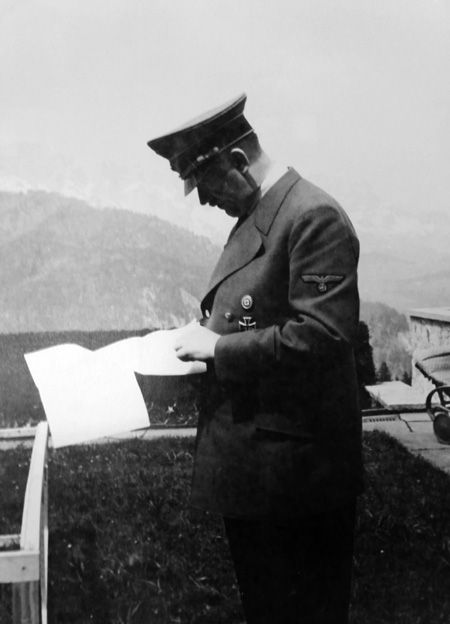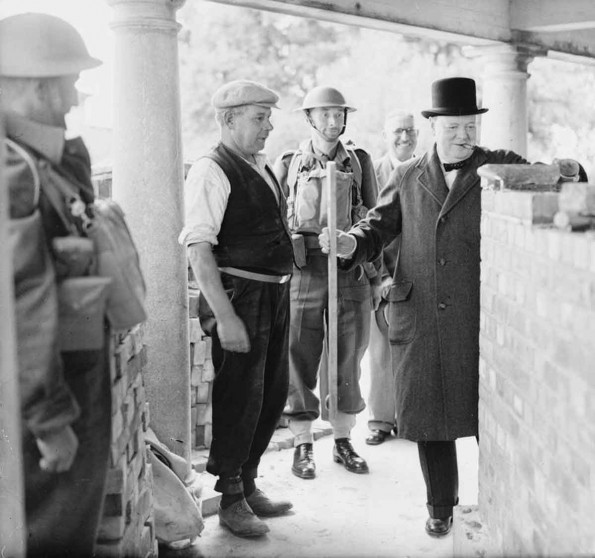Thursday 18 July 1940
 |
| The Berlin military parade of 18 July 1940 (Elsenhardt, Federal Archive). |
At 09:30, the Luftwaffe sends a major fighter sweep of about 30 Bf 109s from JG51 to attack Channel shipping. The RAF responds with 15 Spitfires from RAF Nos. 152 and 610 squadrons.
Luftwaffe attacks against land targets took place at St Margaret’s Bay and the Goodwin Lightship, which was sunk. Another attack on Gillingham destroyed some houses.
The Luftwaffe sent solo bombers against an RAF airfield at Montrose and Cardiff.
A major operation against the Isle of Wight took place at 13:00, with both sides getting victories.
During the night, the Luftwaffe attacks the Liverpool sector, including some minelaying off this key port.
Overall, it was a small RAF victory over England, as the RAF lost three fighters and the Luftwaffe lost a Bf 109, a Heinkel He 111, a Dornier Do 17, and two Junkers Ju 88s.
The RAF announces that its records show that the Luftwaffe has lost 200 planes due to attacks on Great Britain since 3 September 1939.
European Air Operations: RAF Bomber Command raids the Essen Krupp arms factory. It also sends raids against the Bremen and Hamm railway yards, losing one bomber. Coastal Command participates with a raid against the Kriegsmarine base at Emden.
The RAF also strikes against the invasion barges being collected at various English Channel ports. Attacks of 18 Blenheim escorted by 24 fighters are launched against Rotterdam, Boulougne, Le Havre and St. Omer. The British lose three Blenheim bombers.
Adolph Galland of JG26 receives a promotion to Oberst (Major).
Battle of the Atlantic: British submarine H.31 sinks 446 ton German trawler UJ.126 northwest of Terschelling.
U-58 (Oberleutnant zur See Heinrich Schonder) torpedoes and sinks independent 1591 ton Norwegian freighter Gyda northwest of Ireland. There are 9 survivors and 11 perish.
U-99 (Kapitänleutnant Otto Kretschmer) torpedoes and sinks 4434 ton British freighter Woodbury in the southwest approaches about 500 miles west of Land's End. All 35 aboard survive.
The Luftwaffe catches freighter Generton and trawler Loddon in the North Sea and damages them.
British destroyers HMS Express and Impulsive lay a minefield in the North Sea.
German raider Pinguin rendezvouses with U-UA in the Atlantic off Dakar to replenish the U-boat.
Convoy OA 186 departs from Methil.
Heavy cruiser HMS Cumberland, based at Simonstown, South Africa, sets out to search for the German raider Thor, known to be operating in the vicinity. The Cumberland heads north in the direction of Dakar. The raiders Pinguin and Thor, in fact, are both in that general area.
The Admiralty announces that it is taking over all French ships interned in English ports and putting them under joint French/British flags.
 |
| The Munster celebration of Victorious Soldier Day. |
Vichy France sends bombers from Morocco against Gibraltar, killing three and injuring 11. There are reports that many of the bombers drop their loads in the nearby sea because they have nothing against their former allies.
German Propaganda: Radio Caledonia, directed at Scotland, urges the Scots to support independence.
US/Latin America Relations: Heavy cruisers USS Wichita (CA 45) and Quincy (CA 39) depart Santos, Brazil on their "Show the flag" mission. Their next port of call is Rio de Janeiro. On the opposite coast, light cruiser USS Phoenix (CL 46) departs from Valparaiso, Chile for Callao, Peru.
China: Monsoon season is beginning, which will curtail military operations and make supply from the outside difficult. This makes the closing of the Burma Road supply route of less consequence than if it happened at another time of year.
German Homefront: There are major celebrations in Germany in honor of the country's victorious soldiers.
American Homefront: The Democratic Party nominates Franklin D. Roosevelt for an unprecedented third term at its convention. The Vice Presidential nominee is Henry Wallace of Iowa. Roosevelt's decision defies the tradition in US politics that no President serve more than two terms, as had first President George Washington, and this violation of precedent becomes a major campaign issue. He, in turn, runs as a strict non-interventionist. He defends his decision to run by citing the current turmoil in the world:
It is not an ordinary war. It is a revolution imposed by force of arms, which threatens all men everywhere. It is a revolution which proposes not to set men free but to reduce them to slavery—to reduce them to slavery in the interest of a dictatorship which has already shown the nature and the extent of the advantage which it hopes to obtain.Future History: James Brolin is born in Los Angeles, California. He becomes a famous actor in the 1970s, starring in television shows such as "Marcus Welby, M.D." He remains active in the film business as of this writing.
Joe Torre is born in Brooklyn, New York. He becomes a top baseball hitter, playing several different positions for several different teams. He also guides the New York Yankees to four World Championships during his tenure as Manager during 1996-2007.
 |
| Hitler Youth at the parade in Munster, 18 July 1940. |
July 1940
July 1, 1940: Vichy France
July 2, 1940: Arandora Star
July 3, 1940: Operation Catapult at Mers El Kébir
July 4, 1940: Romania In Crisis
July 5, 1940: The Five Freedoms
July 6, 1940: Hitler's High Point
July 7 1940: Dakar And Ringo
July 8, 1940: Tea Rationing in England
July 9, 1940: Battle of Calabria
July 10, 1940: Battle of Britain Begins
July 11, 1940: "Nous, Philippe Petain"
July 12, 1940: Enter Laval
July 13, 1940: German Surface Raiders Attack!
July 14, 1940: Bastille/Mourning Day
July 15, 1940: Tallest Man Dies
July 16, 1940: Plans for Sea Lion
July 17, 1940: Burma Road Closed
July 18, 1940: FDR Runs Again
July 19, 1940: Last Appeal To Reason
July 20, 1940: First Night Fighter Victory
July 21, 1940: Soviets Absorb Baltic States
July 22, 1940: First RAF Night Fighter Victory
July 23, 1940: Invasion False Alarm
July 24, 1940: The Meknés Incident
July 25, 1940: Black Thursday for RAF
July 26, 1940: Capture The Duke?
July 27, 1940: What's Up, Doc?
July 28, 1940: Destroyers Pulled From Dover
July 29, 1940: Barbarossa On The Burner
July 30, 1940: Hitler Delays Sealion
July 31, 1940: Bloody Wednesday of Olkusz
2020





